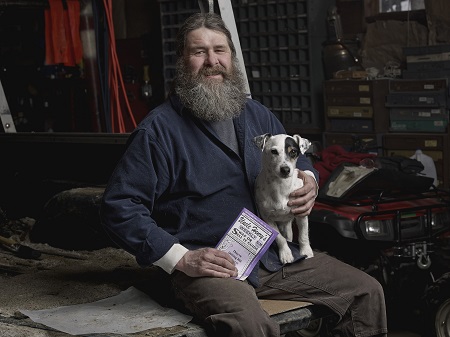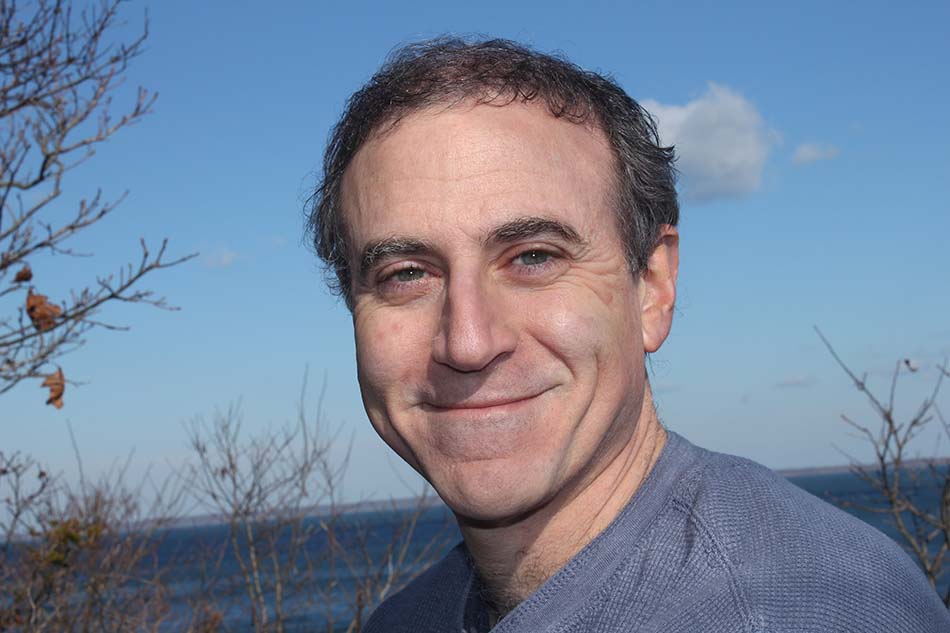Mining Maine
The smarter way to stay on top of the multichannel video marketplace. Sign up below.
You are now subscribed
Your newsletter sign-up was successful

It happens every Thursday in the Northeast: To the glee of many, fresh new copies of weekly magazine Uncle Henry’s Guide come to convenience stores, markets, even auto-part stores, across several states.
Each thick, digest-size issue is a classified ad fan’s dream, with pages of relevant listings for everything from all-terrain vehicles to horses, and from farm equipment and firearms to snowmobiles.
And sure, if you put an ad in, someone may just pay you a few hundred bucks for a rusted but working wood-burning stove, but in a few select neighborhoods way up north, the guide is the central tool for the good old-fashioned art of bartering, and you’d just as soon find someone offering to buff your boat if you agree to part with that stove.
That exercise in bartering, it turns out, makes for some fascinating television. Granted, most of us associate the name Uncle Henry with Auntie Em, but on the History series Down East Dickering — for which the weekly classified guide is the starting point for some remarkably spirited, warm and humorous wheeling and dealing — it’s easy to imagine The Wizard of Oz’s Dorothy declaring, “I don’t think we’re in Kansas anymore.”
In fact, we are not; all that “dickering” takes place in the great state of Maine, a location at once remote and stunning. It’s the undisputed lobster capital of the USA, a vacationer’s dreamland with, conversely, gorgeous beaches and wondrous skiing on snow-capped mountains. It is the first place in the U.S. that the sunrise hits every morning, and it can be brutally harsh during relentless winters.
And all of that is relevant information because Maine is now, quite suddenly, the undisputed reality-television capital, with several series on the air and many more in the development pipeline. Remember when every reality show seemed to be set in the swamps of Louisiana? That place was so 2010. C’mon, people: Wake up and smell the salvage “yahd.”
If 2013 estimates from the U.S. Census bureau put the population of Maine at 1,328,501, rest assured the number is now probably higher by a few hundred producers, casting company executives and camera folks working on several series, not to mention others hoping to do so.
The smarter way to stay on top of the multichannel video marketplace. Sign up below.
Aside from Down East Dickering, which premiered April 2, and another Maine series History is exploring, Animal Planet presently airs North Woods Law and Cold River Cash, with several more shows and Maine episodes of existing series slated to come. National Geographic Channel just greenlit a second season of Building Wild, in which two “cabin kings” try to construct the perfect Maine getaway, and the folks at Al Roker Entertainment have put out a casting call for lobstermen. And all this activity comes a few years after Discovery aired American Loggers, featuring the Pelletier family toiling in the Great North Woods.
“I think people looked on a map and said, ‘Wow, we haven’t seen this yet before,’ ” Elaine Frontain Bryant, senior vice president of programming and development for History, said. “We have lots of shows set in the South or in the logging country, the mountain areas, beautiful areas where people are working with nature, sometimes against nature but on their own terms. We didn’t have anything in this area, and that’s an appeal too; there’s a real freshness to it. And we’re clearly not the only network that said, ‘Well, we’ve got the swamp, we’ve got Texas, we’ve got these places; where else is it that has a fl avor?’ ”
NORTHERN EXPOSURE
For years, Maine’s TV “flavor” has helped make it the capital of the odd and offbeat. “To a degree, there’s a certain mythology that makes it mysterious, and I think that adds to the mystique of the place,” Bill Carroll, vice president and director of programming at Katz Television Group, said.
After all, in the 1960s Maine was where “the Ghost” took up residence at Mrs. Muir’s house, and where vampire Barnabas Collins bared his fangs on Dark Shadows; in the 1980s and ‘90s, mystery writer/sleuth Jessica Fletcher helped solve all manner of murders in the seemingly sleepy coastal town of Cabot Cove on Murder She Wrote. Maine is also the stomping ground of Stephen King, and the setting for novels such as Carrie and Cujo, as well as the short story that was adapted into The Shawshank Redemption.
And most recently (and quite successfully), it is the setting for the popular CBS series Under the Dome, based on King’s novel of the same name about a massive dome that cuts a Maine town off from the rest of the world, the pilot for which scored an impressive 3.3 in the 18-49 demo. The summer series, which contributed to a shift in the way broadcasters are programming for the season, returns June 30 with an episode written by King.
“I think, to keep viewers engaged the people have to be a little different,” Brad Adgate, senior VP of research at Horizon Media, said. “And Maine has lots of characteristics that are different from other regions.”
Not only is Maine different, producers and networks have been discovering, but it has any number of individual worlds to discover, each with its own fascinations. The same state where Tony Bennett — nope, not that one, but a 48-year-old longhaired, bearded, softspoken gentleman — and fellow haggler Roland Raubeson — “Yummy” to everyone who knows him — do their dickering for peanuts is also where three groups of fishermen — known informally as The Eeliminators, The Grinders and the Maineiacs — earn hundreds of thousands of dollars in a remarkably short period, collecting pound after pound of tiny elver eels, an Asian delicacy, on Animal Planet’s Cold River Cash.
What these shows — and all successful, memorable reality fare, really — have in common is a sense of these being real people, living a life on their own terms that viewers safely pine after or somehow admire from the couch.
“It harkens back to a simpler way of life, and that’s part of the appeal of Maine,” Adgate said. “It’s not a get-it-done-yesterday world, it’s a place where you can kind of relax and let your mind wander.”
It’s also a place with an alluring habitat and a feel for the outdoors that invites adventure at seemingly every turn. “You don’t move to Maine to work in an air-conditioned office,” Rick Holzman, executive vice president of programming and strategy, Animal Planet, said. “You live there because you appreciate where you come into contact with the natural world. In an age of multidimensional characters really popping, we find Maine has provided us with plenty of compelling characters to root for.”
LOOKING FOR A FEW MAINE MEN
It has also provided some spirited competition, with producers flocking to the state in search of the best stories possessing that magic formula: the right mix of personalities and an easy fit for a network’s sensibility.
Animal Planet has made the largest inroads and, by its own account, the earliest foray into the area. “When everyone else was looking south to find unique subcultures, we decided that we should look north, so we went up and started North Woods Law,” Holzman said of the series that follows several game wardens of the Maine Warden Service who are on the hunt for wildlife and outlaws.
The wardens make their way through rough terrain, tracking poachers and facing various other animal-related dangers. “We started trying to make inroads in the North, and that’s what started with us looking to Maine in 2011,” Holzman said. “We’ve continued to be there, boots on the ground, with multiple production companies to try to find more and more interesting worlds.”
Maine will be making guest appearances on the network’s series Eric Young Off the Hook and, potentially, Finding Bigfoot — if the research reveals enough legitimate stories up there to do so. Holzman said the network also has a limited series in development that’s already in production, and several other stories that production companies are working through over this coming summer.
Will Maine continue to be the next great rugged TV backdrop? History’s Frontain Bryant, whose network has “one other thing set in Maine that we’re starting to explore,” said yes. “I really believe in the zeitgeist; it’s amazing that when we get one project, we’ll get three,” she said.
In Maine, she added, “there’s trust in a handshake, and a beauty and simplicity to that, and I don’t mean that in any condescending way. I think there’s an honest authenticity to the place.”
In reality TV that authenticity can spread like a virus. “We saw a million Duck Dynasty rip-off tapes,” Frontain Bryant said. “For us it’s not [all about] the region, but I think it’s fun; I don’t think it’s tired yet.”
Holzman is banking on that notion of the freshness of the place and, much like the game wardens on his network, he said he feels a certain protectiveness against the kind of new-series hunters that will no doubt keep descending on the state. “When it’s cold, you want to feel the frost on the windshields,” he said of his series’ desire to show why “there’s something magical to this place. Maine is like an onion; you peel off a layer and you find another.
“For us it’s not a fad,” he continued. “We’re flattered that other people are flocking to Maine but we hope it doesn’t become the new Alaska, where you’re out in the bush and camera crews are bumping into camera crews. We hope it remains special.”
Either way, there’s a good chance it’ll remain in-demand, thanks to the typical pattern of TV producers finding something that feels perfect and shaping it in an attempt to make it even more perfect.
“If these things click, we’ll see more and more of them,” Adgate said. “You know what [candidates] do in New Hampshire, where they keep canvasing the state? That’s what reality producers will be doing in Maine.”
Rob has written for Broadcasting+Cable since 2006, starting with his work on the magazine’s award-winning 75th-anniversary issue. He was born a few blocks away from Yankee Stadium … so of course he’s published three books on NASCAR, most notably, Full Throttle: The Life and Fast Times of NASCAR Legend Curtis Turner. He’s currently the special projects editor at TV Guide Magazine. His writing has appeared in The Washington Post and his origami art has been in The Wall Street Journal. He lives with his family in New Jersey and is writing a novel about the Wild West.

